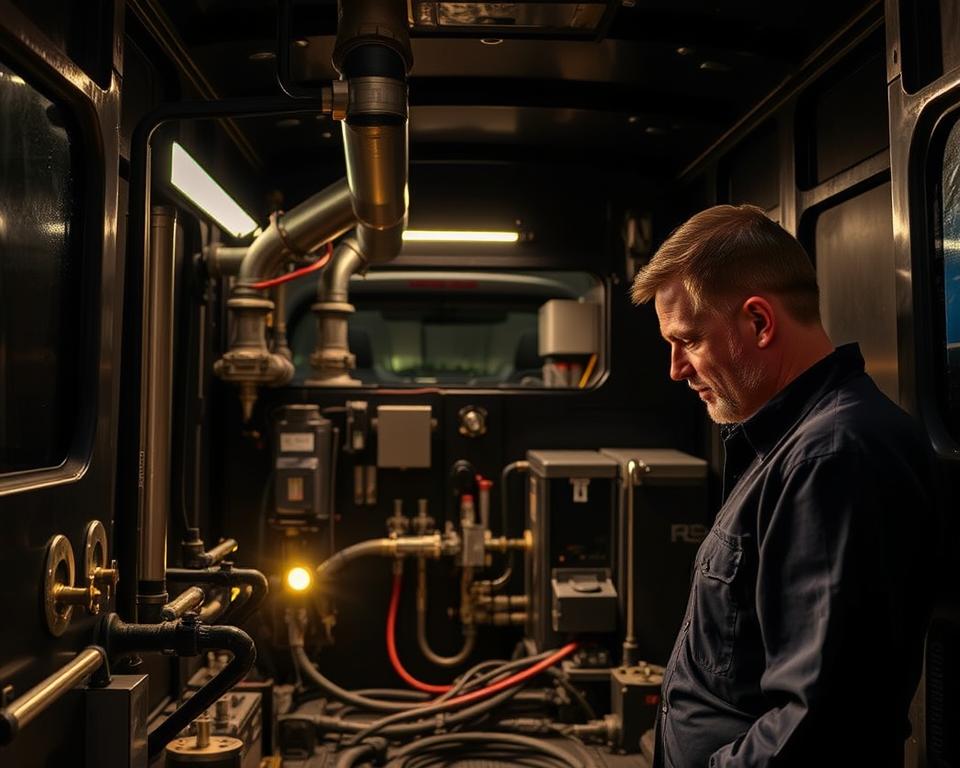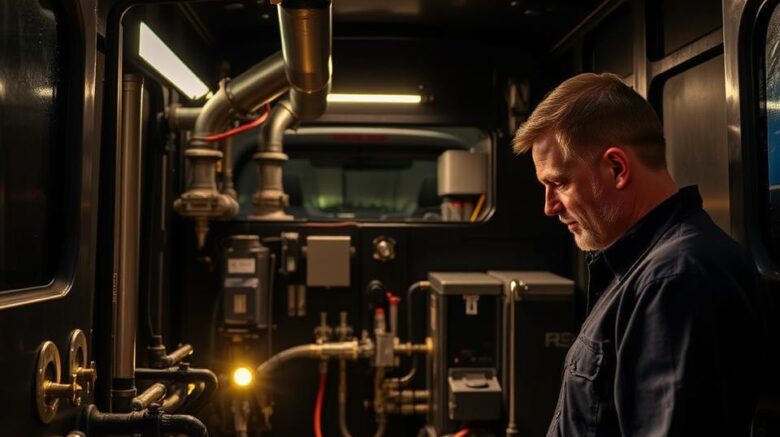Travel Trailer Septic Tank Pumping: Definitive Guide
Ignoring a camper septic system can speedily turn an costly mistake. For those possessing RVs and mobile units, it’s crucial to recognize the value of trailer septic Tank Pumping. It maintains your travels are smooth and living conditions stay sanitary while on the move. By emphasizing regular RV septic service, this guide is designed to make you ready in caring for your septic system, avoiding potential headaches – especially when embracing the great outdoors.
In this article, thorough instruction into picking dependable mobile septic services is offered. Plus, we cover how to detect when your septic Tank calls for urgent attention. Grasping the process for effective RV septic Tank Pumping rounds things out. Instead of responding to issues as they surface, let this guide to equip you with essential knowledge. This ensures your RV experiences keep stress-free!
The Significance of Consistent Trailer Septic Tank Pumping
Routine servicing of your trailer’s septic Tank is essential for its wastewater system’s performance. Delaying this can lead to clogs and backups, wrecking your fun and damaging the environment. Sewage leaks from an over-filled Tank can soil the area, creating major problems.
Teaming up with professional Pumping services like All in Sanitation is wise for trailer owners. This decision prevents issues and boosts your system’s functionality and longevity. Proper Pump-outs create a cleaner, safer environment in RV parks and campgrounds.
Understanding Your Trailer’s Septic System
A camper septic system is made up of three primary elements: the black water Tank, grey water Tank, and fresh water Tank. For RV owners, it’s vital to know these parts. They are fundamental in waste management. The black water Tank contains toilet sewage, whereas the grey water Tank retains water from sinks and showers.
Each Tank has a specific role in keeping the trailer clean and operational. Tracking the levels in the black water and grey water Tanks is important. It staves off overflows, bad smells, and damage to the septic system.
To clarify, below is a table that shows differences between the black water and grey water Tanks:
| Feature | Black Water Tank | Grey Water Tank |
|---|---|---|
| Purpose | Keeps sewage waste | Collects wastewater from sinks and showers |
| Maintenance Frequency | Requires scheduled Pumping | Needs occasional emptying |
| Potential Issues | Odors, blockages from solids | Risk of grease buildup |
| Typical Size | Generally bigger than grey water Tank | Smaller than black water Tank typically |
Knowing your RV’s septic system is cornerstone for maintenance. It ensures hassle-free travel experiences. Watching both Tanks equals trips with zero septic concerns.

Clues Your Septic Tank Needs Pumping
It’s essential to notice when your septic Tank needs Pumping to maintain your system sound. Catching issues early can get around major repairs and environmental harm. Common signs that need attention include:
- Slow draining sinks, which may suggest a full Tank or clog.
- Gurgling toilets, signaling blocked pipes or a failing septic system.
- Foul odors around your camper, an early warning of rising sewage.
- Pooling water near the drain field, revealing that your Tank may be overwhelmed.
- Sewage backups in your toilets or drains, a clear sign immediate action is needed.
Staying alert of these signs allows RV owners to take quick action, preventing grave issues. Keeping tabs on your system and reacting to these indicators can prolong your septic system’s lifespan. This approach delivers a smoother trailer experience.
What Determines Pumping Frequency
A septic Tank’s capacity largely influences how often it needs Pumping. Larger Tanks demand less frequent service because they store more waste, while smaller Tanks demand more frequent Pumping.
The number of RVs using the septic system also affects Pumping frequency. With more RVs, the system experiences increased strain, necessitating quicker Pumping. Particularly in peak seasons, tweaking the schedule is vital to avoid problems.
Here is a table that summarizes recommended Pumping intervals based on typical scenarios:
| Septic Tank Size | Number of RVs | Recommended Pumping Frequency |
|---|---|---|
| 500 gallons | 1-2 RVs | Roughly every 2-3 years |
| 1000 gallons | 2-4 RVs | Roughly 3-5 years |
| 1500 gallons | 4+ RVs | Every 1-2 years |
Properly choosing your septic Tank’s Pumping frequency enhances its operation. It also extends its life and effectiveness. This decision is critical for maintaining system health.
Selecting a Dependable Septic Pumping Service
Choosing a reliable septic Pumping service is vital for your trailer’s septic system health. It secures swift and thorough Pumping, averting expensive future repairs. When shopping for a septic service provider, weigh these important aspects:
- Experience: Look for companies with a solid track record. Their experience with various septic systems, especially those for trailers, is paramount.
- Customer Reviews: Scan online reviews and testimonials. Positive feedback and excellent ratings are markers of a dependable provider.
- Response Time: Fast response times signal a company’s commitment to their customers and readiness to meet their needs efficiently.
- Knowledge of Systems: Exceptional knowledge of RV septic systems elevates some services. Providers like All-In Sanitation grasp these systems well, enabling tailored service.
Focus on these considerations to get the most fitting service for your septic requirements. A dependable septic Pumping service improves your system’s life and performance, delivering carefree travel adventures.
RV Septic Tank Pumping: How It Works
Trailer septic Tank Pumping requires important steps for efficiency and safety. It’s important for RV owners to grasp this process before service appointments.
A technician with a trailer-mounted Pump arrives first, designed for mobile systems. This technology enables effective waste removal while defending the environment. They couple the Pump to the trailer’s system with a hose reaching the Tank.
The Pump then extracts the waste out of the Tank. This action is essential to maintain the septic system operational and avoid overflow. After emptying, the technician assesses the Tank for damage or wear, verifying proper function.
Following the Pump-out, waste disposal is necessary. The hauled waste is taken to treatment facilities for safe processing. This step limits environmental harm.
The process benefits from the trailer-mounted Pump’s effectiveness. Regular service saves time and cost, keeping the septic system in excellent condition.
Urgent Septic Pumping Services
Sudden issues with your septic system can demand rapid intervention. For RV enthusiasts, knowing when to seek emergency septic Pumping is vital to prevent further damage and sky-high costs. Scenarios demanding prompt septic Tank Pumping include backups, unpleasant smells, and sewage leaks. Quickly tackling these issues often requires septic Tank Pump and haul services to efficiently eliminate waste and restore system functionality.
Providers like All-In Sanitation offer 24/7 emergency septic Pumping, making sure help is immediately available when urgently needed. Acting fast with these services markedly boosts your septic system’s lifespan and performance. Having a trusted septic service readily accessible can reduce expenses and stress in emergencies, guaranteeing uninterrupted enjoyment of RV adventures.
Pointers for Caring for Your Trailer Septic System
Keeping your camper’s septic system in excellent shape is critical. Smart maintenance strategies can save you from expensive problems later. Kick off with regular checks for damage, leaks, or strange smells for RV septic Tank care.
Appropriate waste disposal is paramount for a healthy system. Don’t flush items that won’t break down, and use septic-friendly products. It’s important that everyone knows how their actions influence the septic system. This ensures it stays functional and efficient.
- Perform regular checks for leaks and unusual odors.
- Communicate regularly with your septic service provider for on-schedule maintenance.
- Utilize septic-safe toilet paper and cleaning supplies.
- Stop pouring chemicals down the drain that could harm the balance of bacteria in the Tank.
- Schedule for regular professional inspections to detect potential issues early.
Adopting these steps helps RV owners extend their trailer septic systems’ life and performance.
Typical Problems with RV Septic Systems
Trailer septic systems often experience issues that plague RV owners. Handle these issues early to prevent bigger problems later. Clogs in septic Tanks are common, mainly due to not disposing of waste properly. To reduce clogs, stick with RV-safe toilet paper and perform regular maintenance.
Another significant issue is odor control. Bad smells can suggest backups or leaks, demanding immediate action. To reduce odors, ensure the system is well-ventilated and the septic Tank is emptied as needed.
Leaks can develop from wear or incorrect installations. Swift identification of leaks assists in avoiding environmental damage and maintains the system working. Regular inspections are important to catch these issues early.
To get ahead of common issues, follow preventative strategies like scheduled maintenance and proper waste disposal. Prepared and proactive RV owners can savor their travels care-free and with peace of mind.
As a Final Point
Being savvy about RV septic Tank Pumping is vital for RV and camper owners. Routine maintenance and noticing trouble signs in your septic system can improve your RVing experience dramatically. Managing your RV’s septic system well guarantees both safety and comfort during your outdoor adventures.
Selecting a trustworthy service for your trailer’s septic Tank Pumping is critical. Hiring experts like All in Sanitation guarantees your mobile waste management is high-quality. This approach is not just green, but it also elevates* the camping experience, making it more enjoyable and sustainable.
Actively maintaining your septic system lowers emergencies, enhancing your nature stays. Thorough care and know-how empower memorable trips for the best reasons.
